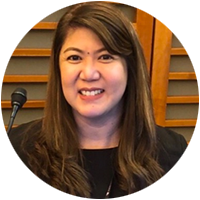Ma. Rowena Muñoz, MD | Surgical Leadership Program

In 2019, Ma. Rowena Muñoz, MD, developed an interest in honing her leadership skills. Based on years of service at the Manila Central University and Cardinal Santos Medical Center, she is now next in line to take on administrative positions, but—like many clinicians—she hadn't experienced specific leadership training during medical school or afterwards.
A Focus on Leadership
When she looked at the Surgical Leadership Program (SLP) website, she noticed that the application deadline was in a matter of days—and decided to apply just before the deadline lapsed. She had to plan a last-minute trip to Boston after she learned she was accepted. "I was very jet-lagged," she remembers with a laugh, "but I made it a point to engage a lot during our classes. It was such an incredible feeling to be among so many accomplished doctors listening to our distinguished lecturers."
Muñoz hails from Manila, Philippines, and works at the Cardinal Santos Medical Center as an Ear, Nose, and Throat (ENT) Head and Neck Surgeon specializing in Craniomaxillofacial Surgery. She is also a professor at the Manila Central University (MCU) College of Medicine and a consultant at Victor R. Potenciano Medical Center, The Medical City Clinic in Manila, and the MCU Hospital.
COVID-19 took the Surgical Leadership Program from a hybrid format—primarily online coursework combined with strategic in-person workshops—to fully remote in 2020 in the middle of Muñoz's program. Although she completed the majority of the course from her home country, she fell in love with the Harvard Boston campus and connected deeply with her classmates when she came for an initial in-person session. "When the pandemic ends, we may gather together officially in 2022, and I hope it happens. We're looking forward to coming back to Boston and having an in-person ceremony. Both to convene in-person once more and to celebrate the completion of our work,” she says.
A Focus on Teaching
Part of the joy of the Surgical Leadership Program for Muñoz was watching the faculty convey the material, both in-person and online. Much of her class came from the United States and thus there was a lot to learn about a health care system and methodology that was different from hers. But Muñoz dove in head-first to learn not just the content but also the teaching style.
"I am also an educator, and I learned so much from the different styles of the faculty," she says, including "how to have fewer and concise slides, move around, and engage my students more effectively." She remembers feeling like she was watching a totally new form of instruction, one that drew students into the coursework. Early in the course, she thrived, particularly in the program interactivity. "I was a bit intimidated at first, but the professors made the course fun and interesting. I slowly felt at ease and actively participated later on," she remembers with a smile. "I wanted to make sure that I made the most out of the program.”
Being part of SLP was particularly beneficial for her, not only because she made connections with her classmates from around the globe but also because she interacted with Harvard professors. For her, forming relationships and discussing individual challenges with other surgeons' teams and departments was the most fruitful aspect.
A Focus on Development
Muñoz's capstone project related to her hospital—to develop an audiology center in Cardinal Santos Medical Center, a tertiary hospital in the metropolis that is strategically situated at the center of the residential and business district of Metro Manila. There are no ENT referral centers in the region with appropriate equipment; thus, the hearing center would be a first step to address treatment delays and patient dispersion. The hospital ultimately plans to build a full-scale ENT center and this will set the stage for that development.
Yet, that is not the only accomplishment she's experienced. Since she's completed the program, Muñoz has already noticed the difference in how she's treated by fellow professionals. "I'm taken more seriously now because people know I completed the program from Harvard," she explains. Taking the Surgical Leadership Program has motivated her to further her studies and get a Master of Business Administration in Health, which she's now completing at the Ateneo Graduate School of Business. It has already prepared her to see the big picture of medical management and global leadership, so she is ready for the work that lies ahead for her.
She now compares herself to "a compass, a Google, and a scalpel" — compass because her new leadership skills can point the team in the right direction, Google because she's an educator giving critical knowledge to her students, and scalpel as the symbol of the surgeon's most important instrument. "The cutting of the scalpel is the first step that surgeons do and the step that initiates the start of the healing process. Therefore, as a surgeon, we must cut first in order to heal.”
“SLP completed the link that was missing all this time," she says. "As doctors, we were taught to lead a medical team to help heal, but we were not taught how to lead a group of people with different backgrounds. The Surgical Leadership Program has equipped me to be an effective leader regardless of the task at hand."
Learn more about theSurgical Leadership Program.
Written by Katherine J. Igoe